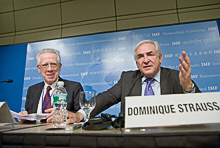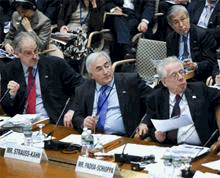
Typical street scene in Santa Ana, El Salvador. (Photo: iStock)
IMF Survey: IMFC Urges Action on Global Economy, Backs Fund Reforms
April 12, 2008
- Global crisis needs a global institution, IMFC head says
- IMFC welcomes Fund reform measures
- Strauss-Kahn warns on impact of food price hikes on low-income countries
Faced with a slowing world economy, continued market turmoil, and increased inflationary risks, financial leaders at the IMF-World Bank Spring Meetings in Washington urged strong action to counter the slowdown, and supported the Fund's efforts to step up analysis of global threats while welcoming successful measures to reform the multilateral institution.

IMF Managing Director Dominique Strauss-Kahn (r) at news conference with IMFC Chairman Tommaso Padoa-Schioppa after panel's meeting (IMF photo)
IMF POLICY GUIDANCE COMMITTEE
Members of the International Monetary and Financial Committee (IMFC), the Fund's primary advisory body, met to discuss how to handle the deteriorating growth prospects for the global economy, the still unfolding events in financial markets, and the growing threat of rising inflation in some economies.
"While each country's situation is different, coherent action must be taken, taking due account of cross-border interactions," the 24-member IMFC said in a communiqué after its meeting on April 12.
IMFC chairman Tommaso Padoa-Schioppa said at a press conference that there was a sense in the meeting that the string of bad news about markets and the global economy had not come to an end and that "a global crisis has to be addressed by a global institution" like the 185-member IMF.
Spirit of multilateralism alive
IMF Managing Director Dominique Strauss-Kahn said the severe and looming problems facing the global economy had helped revive support for multilateralism at the meetings because global problems required global answers. "The spirit of multilateralism is alive and kicking," he declared.
Strauss-Kahn outlined key problems facing the global economy:
• continued financial turmoil resulting from the effects of the subprime crisis in the United States;
• slowdown in the world economy, with no decoupling from this trend by emerging markets; and
• mounting inflation because of high commodity prices, including food prices.
In addition, he said that new imbalances may have appeared in the global economy as a result of the turmoil. The IMF has been involved in a process to try to help countries reduce global payments imbalances.
The IMFC said it supported efforts by the Fund to sharpen its analysis of the financial sector, macrofinancial linkages, exchange rates, and spillovers, as well as deepening work on financial stability issues, while better integrating global and cross-country perspectives. It underscored the need for the Fund to work with the Financial Stability Forum and other bodies to ensure that lessons from the crisis are shared and agreed policy actions implemented rapidly.
Impact of high food prices
Strauss-Kahn warned that the effects of high food prices on some low-income countries, particularly in Africa, could be dire. Hundreds of thousands could starve and children would suffer from malnutrition. In addition, the hikes could lead to disruption "in the economic environments, trade balances, current accounts, so that at the end of the day most governments—having done well during the past five or ten years—will see what they have done totally destroyed and their legitimacy facing the population destroyed also," he added.
"So, if we want to avoid this huge rise in commodity prices, and especially food prices, having terrible consequences, then we need to do much more about this problem than has been done until now."
IMF reforms welcomed
At the IMFC, financial leaders also welcomed measures to reform the IMF, including improved country representation and revamping the Fund's income and expenditure.

IMF's Strauss-Kahn (c) with IMFC's Padoa-Schioppa (r) and IMF First Deputy Managing Director Lipsky at panel's meeting in Washington (IMF photo)
Padoa-Schioppa said that six months ago the reforms had appeared to be very ambitious. But the IMF's Executive Board had approved both sets of reforms and Governors were now in the process of voting. Parts of the reform need an 85 percent voting majority.
The results for the quota and voice reform (country representation) will be known by April 28, but Strauss-Kahn said that following the meetings, he was now confident that the majority would be secured.
"Having listened to the different ministers, I think there is really very little chance that we won't reach the 85 percent that is needed," he stated.
On April 7, the Executive Board endorsed a new package of measures to set the IMF's finances on a sound long-term footing, in a move designed to end the institution's overreliance on income from lending operations to finance its work. The previous month, the Board had backed a resolution that would achieve a significant shift in the representation of dynamic economies, many of which are emerging market countries, and give poorer countries a greater say in running the IMF.
Shift in world economy
Acknowledging the underlying shift taking place in the world economy, with emerging market economies playing an increasingly important role, the IMF reform process aims to better align quotas, which largely determines a country's voting power, in the Fund with member countries' weight and role in the global economy. Equally important, the reform aims to enhance the participation and voice of low-income countries.
Padoa-Schioppa said that the gloomy outlook for the world economy had helped concentrate minds on reform of the institution, founded after World War Two. "I think this reform and the fact that it went so well . . . has to be seen in conjunction with the gloomy picture of the world economy. The fact that the most relevant economic and financial multilateral institution in the world shows a capability to reform itself in this very moment constitutes by itself a response to the crisis, and an indication that a global crisis has to be addressed with a global view and by strengthening the role of multilateral institutions," he said.
"The severity of the crisis that we are in has contributed to concentrating the minds on the need to both reform the Fund and reach agreement on its representation."
Comments on this article should be sent to imfsurvey@imf.org


